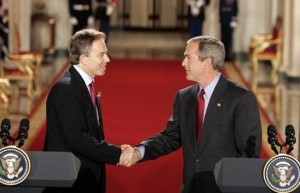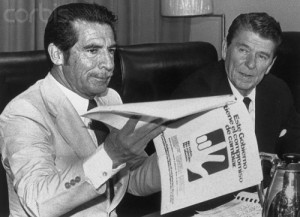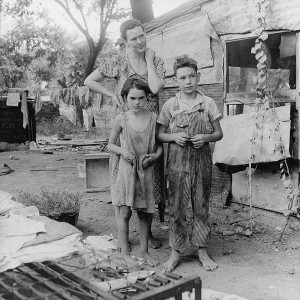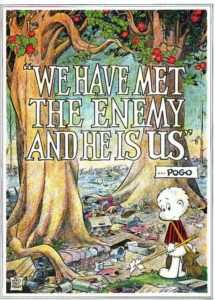The story of modern human history has been the dispossession of working people and the concentration of wealth in fewer hands, now transformed into a system of cradle-to-grave debt, writes Nicolas J S Davies.
By Nicolas J S Davies
After centuries of hard-fought but limited progress, human society seems to be reverting to the law of the jungle. For many of our international neighbors, this means leading lives defined by aerial bombardment, guerrilla warfare, militia rule and displacement as refugees.
For half my neighbors in the U.S., it means living paycheck to paycheck under a corrupt “inverted totalitarian” political and economic system designed to funnel ever greater concentrations of wealth and power into the hands of a greedy and unsympathetic ruling class, exemplified at the moment by Donald Trump, Hillary Clinton, the Koch brothers and Wall Street.
For people everywhere, the fragile collective systems of law, civil and human rights, social welfare, progressive taxation and public services that painstakingly evolved to provide human beings with basic rights and longer, healthier, happier lives are disintegrating into something closer to Thomas Hobbes’ Seventeenth Century nightmare of a violent and chaotic world in which most people’s lives will be “solitary, poor, nasty, brutish and short.”
If we understood more of our own history, we might grasp a little better the fragility of the improving quality of life we or our parents once took for granted, the competing forces of progress and greed that have shaped the world we live in, and the mechanisms by which greed keeps rearing its head to undermine progress in spite of all our efforts.
Until I read Eric Hobsbawm’s quartet of books that begins with The Age of Revolution: 1789-1848 and ends with The Age of Extremes: 1914-1991, I did not know that my own great-great-grandparents in newly industrialized Dudley in England’s Black Country were born with an average life expectancy of only 18 years.
I also learned from Hobsbawm that, when I was born in a British dockyard hospital in Sri Lanka in 1954, at least half of my fellow human beings still lived as subsistence farmers in societies that had evolved for centuries with less radical change than they have now experienced in my own short lifetime.
Loss of Communal Rights
In the bat of an eyelid in the sweep of human history, traditional ways of life based on communal rights to land and centuries of accumulated wisdom about how to live on it have been shattered and discarded.
On Friday, Consortiumnews reported on the crisis of landlessness and poverty that has led to decades of resistance and repression in the Philippines. Throughout the “developing” world, a billion poor, landless people have been herded into new megacities ringed by endless slums and shanty-towns, to lead lives defined by low-wage labor, street life, extreme poverty and insecurity, and unsanitary and toxic environments – not unlike Dudley in the 1830s.
The predicament facing our fellow creatures is even worse than our own. The World Wildlife Fund reported recently that the Earth’s total population of wild animals, birds, fish, amphibians and reptiles has declined by 60 percent since 1970, and that the decline has accelerated in the past five years despite current conservation efforts.
The shattering of relationships between people, communities and the land they live on is in large part the culmination of a process that began in England 500 years ago. In medieval times, English peasants were forced to work their feudal masters’ land, but they also had access to common land where they could build homes, grow crops and graze animals.
Then landowners began to “enclose” formerly common land in what we would now call a privatization of land, the most vital resource in an agricultural society. Feudal lords gradually became “modern” landlords and employers, scattering their former vassals to the wind with no right to land on which to build cottages, grow crops or graze animals.
As Thomas More wrote in Utopia in 1516, greedy landowners discovered that grazing sheep could be more profitable than sharing land with other human beings: “…the nobility and gentry, and even those holy men, the abbots, not contented with the old rents which their farms yielded, nor thinking it enough that they, living at their ease, do no good to the public, resolve to do it hurt instead of good. They stop the course of agriculture, destroying houses and towns, reserving only the churches, and enclose grounds that they may lodge their sheep in them…
“[Ordinary people] are put in prison as idle vagabonds; while they would willingly work, but can find none that will hire them; for there is no more occasion for country labor, to which they have been bred, when there is no arable ground left. One shepherd can look after a flock which will stock an extent of ground that would require many hands if it were to be ploughed and reaped. This likewise in many places raises the price of corn.”
Orwell’s Dim View
George Orwell echoed More’s dim view of property owners and the enclosure of common lands in a column in Tribune on Aug. 18, 1944:

British Prime Minister Tony Blair and U.S. President George W. Bush shake hands after a joint White House press conference on Nov. 12, 2004. (White House photo)
“…the so-called owners of the land … simply seized it by force, afterwards hiring lawyers to provide them with title-deeds. In the case of the enclosure of the common lands…, the land-grabbers did not even have the excuse of being foreign conquerors; they were quite frankly taking the heritage of their own countrymen, upon no sort of pretext except that they had the power to do so. Except for the few surviving commons, the high roads, the lands of the National Trust, a certain number of parks, and the sea shore below high-tide mark, every square inch of England is ‘owned’ by a few thousand families. These people are just about as useful as so many tapeworms.”
The proportion of common land in England shrank from a third in 1500 to 27 percent by 1600, and has kept shrinking ever since. A series of parliamentary “Inclosure Acts” codified and regulated this process in the Eighteenth and Nineteenth centuries, and the newly dispossessed provided a captive labor pool for new factories in places like Dudley, where women and children worked in conditions previously imposed only on convicts.
Before the Second World War, hundreds of “commoner” families still grew crops and grazed animals in Ashdown Forest, the largest remaining area of common land in southeast England (and the setting for A.A. Milne’s Winnie-the-Pooh stories). The commoners won a famous court case to uphold their rights in 1881, but half the remaining commoners lost their rights by failing to re-register under a new law in 1965. There are still 730 registered commoner families living in the forest, but reportedly only one family still makes its living grazing cattle on the common land. The others lead “modern” lives like the rest of us.
After the Jacobite rebellions of 1715 and 1745, Scottish clan chieftains followed the example of the English lords, turned their lands to sheep farming and ethnically cleansed their clan members – their own extended families – from the highlands.
The haunting emptiness of that landscape today is the result of a crime against humanity, well documented in John Preble’s classic, The Highland Clearances. Memories of burned-out crofts live on across the sea in place names like Ben Lomond in California, named for the last Scottish mountain the dispossessed highlanders could see from the decks of migrant ships sailing down the Clyde.
Destroying the Mayans
In the highlands of Guatemala, where indigenous Mayan peoples have fought fiercely to save their land and their culture for 500 years, girls at American mission schools are forced to exchange the beautiful traje (traditional clothes) hand-woven by their mothers and grandmothers for Scots tartan uniforms, cheap factory-made imitations of the traje of another highland culture who were banned from wearing it themselves after the Jacobite rebellions. The irony seems to be lost on their American benefactors.

President Ronald Reagan meeting with Guatemalan dictator Efrain Rios Montt, who mounted an extermination campaign in the Mayan highlands that was later denounced as “genocide.”
As Europe’s rulers and landowners emptied their throwaway people into the Americas and other settler colonies, they spread the privatization of land and the destruction of traditional societies to new regions, leading to genocides of indigenous people and their cultures across the Americas and the world.
Colonial and post-colonial rulers alike have pitted the dispossessed of Europe against indigenous people in elemental struggles for survival in which the ultimate winners are always the wealthy few who can take advantage of the commodification of the Earth to claim ownership of more and more of it.
Across the world, legal concepts that evolved out of medieval English property law now serve as mechanisms to dispossess hundreds of millions of people: either because they have no paper title to land their families may have lived on for centuries; or because the extra land they would need to support a growing extended family has already been expropriated by wealthy landlords or agri-business companies; or because neoliberal government policies force small producers to compete with transnational companies in global markets, where prices of food and basic commodities fluctuate dramatically without regard for their impact on real people’s lives; or because, as many Americans have experienced, they are swindled into debt and foreclosure by greedy bankers, wealthy investors, corrupt governments and courts.
The foreclosure crisis in the U.S. then dumped millions of its victims into newly inflated rental markets to be exploited all over again by other investors who are now their landlords.
Privatization on Steroids
Now these concepts of private ownership and property rights are expanding into new areas of life under novel legal constructs like intellectual property law, “free” trade and investment agreements, corporate personhood, binding arbitration, investor-state dispute settlement and global patent law.

A classic photo of a poor mother and children in Elm Grove, California, during the Great Depression. (Photo credit: Library of Congress)
These create new opportunities for privatization and profit, leaving ordinary human beings farther adrift in captive markets where more and more of the basics of life, from food to medical care to housing to education, must be bought at a premium from increasingly monopolistic corporations. The cradle-to-grave welfare state promised to the men who marched home from World War Two has metamorphosed into cradle-to-grave debt for their grandchildren.
As traditional communal land ownership was replaced by new systems of private property across the world, the rise of socialism and communism in the Nineteenth and Twentieth centuries was an attempt to restore social justice, community and communal ownership through new forms of political and economic organization. It should therefore be no surprise that the collapse of the U.S.S.R. and the resulting expansion of the neoliberal world led to an unbridled global acceleration of privatization and the accumulation of all forms of wealth in fewer and fewer hands.
In the Western world, the prior gains of movements for labor, environmental, civil and human rights have fallen victim to a rampage of neoliberal political and economic policies, backed by triumphalist claims for the “magic of the market” that have more in common with religious dogma than social science. But the laws of economics have not really changed since the 1930s, when an apocryphal saying attributed to J.M. Keynes defined this kind of laissez-faire capitalism as “the absurd idea that the worst people, for the worst reasons, will do what is best for all of us.”
The parasites who Orwell called the “so-called owners” of the world think they have built an impregnable legal fortress on the equally absurd idea that they own everything and that the rest of us therefore come into the world with nothing and must pay them for the privilege of living here. This is not the way that human beings have lived throughout our history on Earth, and it is not an improvement.
These so-called owners now threaten our very existence with their insatiable greed and genocidal behavior. So let us make sure that this disastrous experiment is short-lived, and that it ends, not in a nuclear holocaust, nor with a society destroyed by climate change, but with a peaceful, sustainable world that we will all love, share, and safeguard for future generations.
Castro’s Death
With the death of Fidel Castro, the world has lost the most prominent world leader of his generation to clearly and consistently challenge the immorality and absurdity of allowing the world to be ruled by such a parasitic and dangerous ownership class. China’s Xinhua news agency rightly called him, “a pioneer in battling the current international economic order, particularly against the capitalist system, neoliberal globalisation, foreign debt and exploitation of natural resources.”
With his passing, to quote another leader of his era, “The torch has been passed to a new generation.”
The Republican sweep in the 2016 election presents this generation of Americans with challenges that should be familiar by now after several decades of neoliberalism, notwithstanding the surprise rebranding of Donald Trump, a bigoted billionaire and TV game show host, as our new president.
In the conclusion of his masterwork, Century of War, historian Gabriel Kolko proposed a formula for a pragmatic way forward that is just as pertinent today as when he wrote it in 1994.
“In the last analysis,” Kolko wrote, “how means and ends are defined (is) constrained only by a quite simple dedication to being on the side of the oppressed, the disadvantaged, and the people who really work to earn what they spend, whenever the basic criterion of who should gain or lose in a society is applied. In the most basic sense, when the question of ‘whose side are you on’ is asked, this is ultimately the only response to it that makes the entire historic tradition of reform, the improvement of society, and socialism both meaningful and consistent… And it complements an equally necessary devotion to the prevention of war.”
Kolko’s prescription remains a rational political response to the global crisis in which we are living. Its relevance has not been diminished by anything that has happened under the Clinton, Bush or Obama presidencies, and it will remain a solid basis for principled opposition and united resistance to whatever further madness the Trump administration unleashes on the world.
As Kolko prophetically concluded,“…there are no easy solutions to the problems of irresponsible, deluded leaders and the classes they represent, or the hesitation of people to reverse the world’s folly before they are themselves subjected to its grievous consequences.
“So much remains to be done – and it is late… While the prospects for essential and sufficient changes are very uncertain at the present moment, allowing the world’s drift since 1914 to reach its inevitable destructive culmination is a course that our natural desire for human survival instinctively rejects…
“Dispelling the myths of history, dismantling the pretensions of conventional wisdom and of leaders who claim omniscience, and discarding the shibboleths of ideologies that have betrayed their followers are all preconditions for escaping from the fatal illusions and errors that [the Twentieth] century has bequeathed to us.”
Nicolas J S Davies is the author of Blood On Our Hands: the American Invasion and Destruction of Iraq. He also wrote the chapters on “Obama at War” in Grading the 44th President: a Report Card on Barack Obama’s First Term as a Progressive Leader.




Am I the only one disappointed that an article with “The Dispossessed” in the title did not once reference the masterpiece by Ursala K LeGuinn by the same title? (Though it is labelled “Science Fiction”, its comparison of economic models would have been appropriate, though perhaps too radical in their implications for this tepid author.)
The “Owners”, by whatever name, are the Truly Useless Eaters and Breathers.
Thanks for this brilliant article, clear, succinct, and important.
Until I read Eric Hobsbawm’s quartet of books that begins with The Age of Revolution: 1789-1848 and ends with The Age of Extremes: 1914-1991, I did not know that my own great-great-grandparents in newly industrialized Dudley in England’s Black Country were born with an average life expectancy of only 18 years.
Farther north in the Kingdom of Fife, home county of Adam Smith, author of “The Wealth of Nations,” coal miners were indentured labor living lives only slightly better than those of slaves. In this work, Smith endorsed an anti-slavery perspective based on economic principles. – http://www.umich.edu/~ece/student_projects/slavery2/adamsmith.html
Nicolas Davies – really good article. Thank you.
“In the Western world, the prior gains of movements for labor, environmental, civil and human rights have fallen victim to a rampage of neoliberal political and economic policies, backed by triumphalist claims for the “magic of the market” that have more in common with religious dogma than social science.”
The “market” is only used when we lose. Somehow miraculously the market just stepped in and we were on the wrong side. “So sorry, but the market has spoken.”
Whenever the elite lose, the “market” suddenly disappears, to be replaced by bailouts, rule changes, fines, and lots of people looking the other way.
What appears to be a market is not. It’s actually an engineered and manufactured fraud. We are herded this way and that, depending on the “scam” of the moment. The elite: “Boys, stocks have run their course. I know, let’s crank up housing. We’ll pretend we want to help the poor. We’ll allow no doc, no money down, and crank out mortgages to anyone that breathes. We won’t hold these mortgages on our books like we used to. We’ll securitize them, sell them off to unsuspecting investors. Crank this baby up, boys. There’s money to be made. When it all falls apart, who cares? We’ll have made our fortunes by that time. Besides, we’ve got an Attorney-General (Holder) who doesn’t believe in jail terms for bankers, only fines. What’s a fine? The price of doing business. (Laughter all round).”
HAD there actually been a free market system, interest rates to people who could barely afford a mortgage would have been much higher, as they’re a greater risk. In fact, you’re probably not going to lend to people like that at all, if you want to ever see your money again. In fact, it’s a shame that the really poor were ever given a mortgage because what it did was it increased “demand,” which forced prices higher, thereby hurting the next poor person.
When the 2008 crisis occurred, let’s take a look at what the “free market” did. Why, it magically stepped in and bailed out the bankers. IF there actually had been a free market, the Wall Street banks would have all been bankrupt. They were all insolvent. The “free market” would have crushed and rolled over them. The banks would have been nationalized, split up into small pieces, and sold off. There’s always a buyer.
Further, the free market magically stepped in again and allowed the banks to keep these mortgages (the ones they were unable to sell off to unsuspecting investors because these unsuspecting investors finally wised up) on their books at full value, courtesy of FASB. The rules were changed for the bankers to allow this to happen. Imagine holding a bunch of junk on your books, but allowed to claim full price for this junk. Presto, you’re suddenly solvent again!
HAD there been a free market, the people who couldn’t afford their mortgages would have been out of a house (as they were, anyway) and the banks would have gone under. Prices would have dropped off a cliff. But this would have enabled the poor to step back in, purchase a house that was probably a third or half of what they paid previously, and life would have gone on.
INSTEAD, the banks sold these houses off to private equity investors at interest rates we would never have been able to get. The bankrupt homeowners now rented off the new boss, same as the old boss. Because these private equity investors bought so many houses, and there was so much demand for a place to rent from the now-bankrupt homeowners, prices began to rise, along with rents. Which just ended up hurting the poor again.
Whenever the government gets involved, they pick winners and losers. The losers who are getting subsidized housing don’t care because it’s not hurting them (again, the government is propping them up). By propping these dependent people up, they take away a large chunk of society that would rightfully be furious about what is happening. This might lead to something actually being changed, but instead it doesn’t. Problems are papered over just enough to keep people from calling for change.
IF the free market would have been allowed to work, the poor might still be renting right now, but at a much lower cost. But the real magic is that the bankers (who committed fraud) would have been in jail, or at least unemployed. The banks would have been split up into smaller pieces, and we’d now have a lot more competition which tends to keep prices down.
There never has been a “free market”. It has always been totally manipulated and engineered to the benefit of the few. The far left, while calling for help for the poor, remain in league with the Oligarchs (although they don’t know it) because they think their screaming for justice wins a few crumbs. What they don’t realize is that the Oligarchs were going to provide those few crumbs, anyway, as they want to maintain the status quo. Geez, rioting peasants have a way of changing things. So, in essence, the far left and the Oligarchs work together in a sick sort of relationship that keeps everything the same. No real progress.
A free market would have ripped the lid off this whole engine, laid bare the fraud, and the broken components would have been scattered for all to see. As it is, the government stepped in to help the Oligarchs. The government provided programs under the guise of helping the poor, but they were really programs to maintain the system for the Oligarchs.
Until the poor are left to twist in the wind, nothing will really change. It might sound harsh, but in the end it is the only way to help the poor.
I enjoyed reading Edwin von Mises’s works, as well as Hayek’s.
However, your post just succinctly synthesized recent economic and political history into an easily understandable thesis that I enjoyed greatly, and is on par with the “Greats”.
Your post should be made available on other sites, and possibly on college campuses.
Good work.
I’m always hungry for news outside the “mainstream” history books, and these books draw me like a porch light attracts moths. Naturally my public library doesn’t have a single title by Hobsbrawm, probably because he’s a “Marxist”. So I’ll just have to bite the bullet and buy them myself.
Thanks to author Nicolas J S Davies for this interesting essay.
Try these dot coms for bargains: alibris, abebooks and betterworldbooks
I do end up getting quite a few of my books from those places, but I generally find them while using a single ‘umbrella’ search place.
http://used.addall.com/
Last year I found an amazing buy at Amazon Canada for a book which was less than half the price of any bookseller in the US. I learned of its existence from the addall search.
Great site. Thanks for sharing
Even better is interlibrary loan. Free.
THE ELOQUENCE OF J S DAVIES
For essays such as “Reflections on the Dispossessed” we all owe a
great deal to Nicolas J. S. Davies.
With thanks as always,
—-Peter Loeb, Boston, MA, USA
After centuries of hard-fought but limited progress, human society seems to be reverting to the law of the jungle.
A legend attached to Benjamin Franklin has him leaving the Constitutional Convention in 1781 and being asked, “What have you wrought?” He was said to have replied, “A republic, if you can keep it.” – a response that suggests an awareness of human failure to be vigilant in the preservation of its civil and other assets.
In the recent election over 120 million people voted for the two leading candidates with histories – contrary to their campaign propaganda – of indifference to the welfare and well-being of the American people.
Clinton’s slogan of “Working For Us” and Trump’s about “Making America Great Again” are, as far as the American people are concerned, as worthless as Obama’s hopey-changey bullshit. Clinton more likely had the one percent, of which she and her family are members, in mind as “us” while Trump is thinking of making American great again for him and his friends who are also members of the one percent. Stocks have risen considerably since the election so Wall Street’s reading of the tea leaves appears to agree.
Meanwhile, most Americans appear to be sleepwalking in the emerging jungle.
Yeah. It looks like one more great disappointment (for the “give Trump a chance” folks) is necessary, before the great Black and Blue collar alliance (insights that RFK and MLK gained, at the cost of their own lives) for the promotion of the General Welfare of the 99%ers can finally coalesce around a People’s Party that is bought-and-paid-for by the people themselves, as if they were paying “Union Dues” to keep their Party clean and free of Oligarchs attempts to bribe and buy the Party Leaders off. This effort will require tens-of-millions of citizens ponying up a small monthly donation so the People’s Party activist/organizers can plan strategy to out-flank the Oligarchs (the incompetent & disgustingly self-promoting “Managerial Elite”) and take back our Country from their ruinously incompetent & criminal rule.
Yeah. It looks like one more great disappointment (for the “give Trump a chance” folks) is necessary
It is not only the give-Trump-a-chance-folks but also all of those sticking with the Democratic (?) and Republican parties despite the overwhelming evidence of the last 30-plus years of the rich getting richer and the poor becoming poorer so that we have tens of millions of people, including millions of children, living in poverty with many of them homeless. Thanks to both parties..
This effort will require tens-of-millions of citizens ponying up a small monthly donation so the People’s Party activist/organizers can plan strategy to out-flank the Oligarchs (the incompetent & disgustingly self-promoting “Managerial Elite”) and take back our Country from their ruinously incompetent & criminal rule.
Precisely, but there is also a corresponding need for a leader and people to recognize that leader. Bernie Sanders appeared to have that potential, but he lacked the qualities needed to go the extra mile.
Yes, rejection of the D-Party too. I was implying that the D-Party rejection already occurred with Obama’s stunning failure as Prez. This may be the first election where a majority of both D and R Party voters didn’t care for, or even hated, their own candidate, but were even more afraid of “the other guy”.
Right. There is a need for a leader to arise. I wouldn’t be surprised if the Oligarchy has an “app” for early detection of such potential leaders, and have them seduced or whacked before achieving charismatic critical mass.